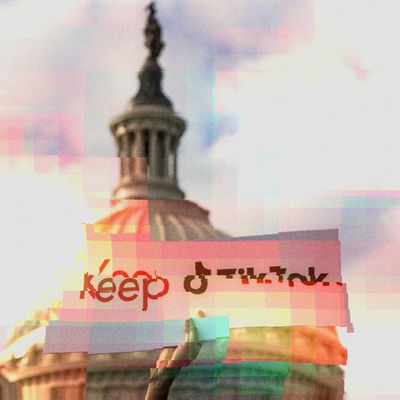
Nearly four years ago, Donald Trump attempted to ban TikTok with an executive order, describing the app’s connections to the Chinese government, its data collection, and the threat of disinformation as part of a “national emergency.” This week, a bipartisan bill that targets TikTok and cites the threat of “foreign-adversary-controlled applications” looks like it has a real shot at becoming law, and President Biden says he will sign it if Congress sends it to his desk. Former president Trump now says that, actually, “there’s a lot of good and a there’s a lot of bad with TikTok,” that the issue is “tough,” but that a TikTok ban would benefit Meta, which is a “true enemy of the people.” Surprise: Lindsey Graham is suddenly “very conflicted” on the matter.
Across the board, though, lawmakers are confused about their parties’ positions. TikTok is appealing directly to users, urging them to call their representatives. A distinct and strange possibility is emerging: The United States government could ban one of the most popular apps in the country, and neither party will be in a position to take credit — or accept blame — when it happens. In some ways, the campaign to ban TikTok is falling apart while it gains potentially unstoppable momentum. What’s going on?
Theory 1: It’s Money
In 2020, TikTok was an easy target for Republicans, Trump in particular. He had campaigned and held office as a China hawk, and TikTok was a relatively new app with a Chinese parent company. TikTok was growing fast but was still much smaller than its American competitors. At first, it was popular primarily with very young users, which made threatening to ban it all but politically riskless.
TikTok has been lobbying lawmakers in both parties since 2019, recently ramping up its spending considerably. This hasn’t been overwhelmingly effective, but lately something seems to have gotten through. According to ABC:
As Donald Trump reverses his position on potentially banning TikTok ahead of an expected House vote this week on legislation that could lead to it being blocked in the U.S., the former president has been rebuilding his relationship with a GOP megadonor who reportedly has a major financial stake in the popular social media platform.
Trump met with the donor, hedge fund manager Jeff Yass, earlier this month at a Club for Growth donor retreat in Palm Beach, Florida, on March 1.
Trump’s campaign needs money. Club for Growth has a lot of money, much of which comes from Yass, who is worth more than $27 billion and has spent more than $130 million on political causes since 2020. The hedge fund he runs has a $33 billion stake in ByteDance. The financier has reportedly been “bullying” Republican lawmakers to oppose the bill, and Club for Growth has hired Kellyanne Conway to advocate on TikTok’s behalf. Her position now is that a softer TikTok ban than the one her former boss attempted to enact unilaterally would be “draconian.” Sure! There’s no use pretending this isn’t what it looks like, and any account of TikTok’s fate would be incomplete without it.
Theory 2: It’s Partisanship
Trump tried and failed to ban TikTok and didn’t succeed in forcing ByteDance to spin off the app to an American company. Now, his likely opponent in the next presidential election could be in a position to sign a bill into law making good on one of his former pet issues. It would not be out of character in the slightest for Trump to reflexively oppose something he previously supported just because his successor is now doing it. It’s a big part of his whole deal!
There is also a potential political opportunity here. If a TikTok ban actually passes, and if TikTok actually goes offline, tens of millions of Americans will lose access to something they use electively and on purpose and with which they spend a lot of time. This would be uncharted territory, and I won’t pretend to know how the general public would respond or how that response might manifest in electoral terms. But if it turns out that banning TikTok — a moderately popular position among voting-age Americans — is upsetting or disappointing or shocking to, for example, the tens of millions of young people who have fun and in some cases make money using it, you can be sure Republicans will emphasize that it happened under Joe Biden’s watch.
Democrats haven’t stood still on the matter of a TikTok ban either. In 2020, many opposed Trump’s executive orders on a variety of grounds; in 2021, Biden rescinded but also replaced them with orders to initiate a Commerce Department review of the app and its connections to the Chinese government. In 2022, as part of a large spending bill, Biden approved a TikTok ban on government devices. In 2023, the Biden campaign signaled that it wouldn’t be using the platform directly but would instead lean on influencers to reach young voters. In 2024, his campaign joined TikTok anyway. They’re not really sure what to do here.
Depending on whom you ask, TikTok has become either a signal or a source of deep problems for Democrats as a platform where young progressives have shared their dissatisfaction and anger with the president over U.S. support of Israel’s war in Gaza, the failure to deliver large-scale student-loan relief, and a range of other issues on which the president is out of step with left-leaning potential voters. Neither possibility is ideal for mainstream Democrats: Either TikTok is a platform where progressives are actively and uniquely radicalized against the party’s presumptive nominee, or it’s just the default venue for young people to post about politics and those young people seem to think Biden isn’t doing a very good job. The former explanation holds some appeal for exasperated Democrats who might take comfort in explaining away ideological differences with an app, an algorithm, or a few viral videos. The latter, however, seems to comport with reality in a few inconvenient ways.
Theory 3: It’s That the TikTok Ban Isn’t Considered Real, and Neither Is TikTok
Over the past couple of years, TikTok has been in the process of negotiating a deal with the Biden administration in which Oracle, an American tech company, would act as both a service provider and sort of an auditor for TikTok — an awkward arrangement that was off to an adversarial start. The new bill would reset any such arrangement but, in fact, stops short of an outright ban: ByteDance would have the option of divesting itself of TikTok by offloading it to an American firm, in which case the app would not be banned.
It’s a serious bit of industrial policy — forced divestiture of an app worth billions of dollars! — but it also provides a bit of an out for lawmakers who support the bill. Maybe they don’t have to ban a popular app and can instead just fix it by cleaving it from ByteDance, handing it over to an American firm, and cutting ties to the Chinese government.
What this would look like in practice is anyone’s guess, but I doubt it would go smoothly. The most obvious buyers would be American internet giants like Meta or Google, but this would present clear antitrust issues. Besides, Meta’s plan to turn Instagram into a TikTok clone is going just fine; it doesn’t need anyone’s help when it comes to surveilling its own users for profit; and, as Trump has suggested, its advertising business would probably benefit from the disappearance of one of its largest direct competitors. The controversial former Activision CEO Bobby Kotick may be interested, however, according to The Wall Street Journal:
At a dinner at an Allen & Co. conference earlier this week, Kotick floated the idea of partnering to buy TikTok to a table of people that included OpenAI CEO Sam Altman, according to people familiar with the situation. OpenAI could use TikTok to help train its AI models if a partner such as Kotick could raise the capital for such an acquisition.
From the perspective of someone who has never used TikTok, doesn’t really know what TikTok is, and doesn’t talk to many people who spend time on the platform — say, a typical American lawmaker — scenarios like this may sound like neat solutions to a difficult issue. To ByteDance, and the Chinese government, they may not be acceptable. In Chinese state media, the message has been pretty clear, as in this editorial in the Global Times. “ByteDance cannot back down this time,” writes former editor Hu Xijin. “Only by legally and reasonably persisting can it possibly see a bright future.” As long as ByteDance remains “willing to shut down TikTok rather than give up ownership,” he writes, “it will create reverse pressure on the passage of the bill.”
Whether or not this is an accurate read of American legislative politics, the position makes some sense: A situation in which companies with connections to China can be effectively seized on national security grounds is in many ways worse than not doing business in the U.S. at all. Why bother? If the bill passes and survives legal scrutiny, the outcome imagined by many of its proponents — the win-win spinoff scenario — may not be on the table, turning the “ban” into an actual ban.
In the context of U.S. politics — where TikTok is treated as an extreme but abstract phenomenon, a conspiracy to encode Americans with foreign ideology, a psyop to give them the tools to radicalize themselves, or a megascale blackmail operation run by a foreign power — the prospect of a ban has been normalized over a few years, but it will feel genuinely wild to the 150 million+ Americans who interact with the app in any given month and who for the most part understand TikTok as neither categorically different nor obviously worse than any of the other social-media services on their phones, the removal of which would be clearly bold and, in some cases, personally disruptive. It’s a pretty big disconnect between lawmakers and at least some of their constituents! And in the end, the bill might pass anyway.






























